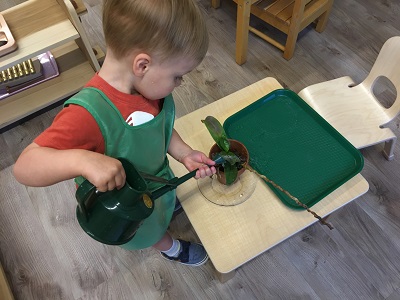We’ve discussed in previous posts what Practical Life activities are, how they are designed, and their overall purpose. What we will now highlight is how these experiences with Practical Life activities are actually shaping the foundation of the child’s mind and character.
A child under the age of six has what we call in Montessori an Absorbent Mind. This means that a child learns differently during this period of his life. Rather than learning through conscious effort as an adult or older child would, a young child quite literally absorbs the world around them simply by existing and acting with his environment. This is what allows a child to quickly acclimate to whatever culture and language that he is born into.

Therefore the habits that are developed while working with Practical Life activities during this critical period in a child’s life are critically important. These experiences begin to form the basis of the child’s personality having lasting impact even as the child enters into adulthood. Some key examples of this are:
Independence
A Montessori child will grow up with the confidence that she is competent and can rely on herself. Because practical life activities were part of her daily life when she had an absorbent mind, these same activates don’t feel burdensome in adulthood and in fact remain joyful.
Concentration
Developing concentration early on in life allows a child to dig deep into an activity or interest area. This ability to focus helps a child to develop a love of learning that stays with a person their whole life. The confidence that a young child builds in her ability to concentrate on the task at hand and master it over time opens up a world of possibilities once she enters adolescence and adulthood.
Control of Movement
Since Practical Life activities are broken down and carefully sequenced, a child effortlessly absorbs this sense of order and sequence while working through the activities. This then builds basic analytical skills which prepare the foundation for math, problem-solving, or organizing thoughts and actions down the road.
Respect of Self and Community
The child’s joy of caring for themselves and their environment begins in early childhood and carries on into adulthood. When a Practical Life activity is first being done as a child, he does it only for the joy of the movement itself and repeats the activity often. This then transforms into a pride of taking care of something that is important to him. As the child enters into the Elementary years, he will complete the activity only when it is needed, but will experience that task as a joy and not a burden. Over time as a child’s skills advance, the activities expand in complexity. He will also take responsibility for his environment with pride and confidence as he’s learned from experience that he can have a positive impact on his environment.
